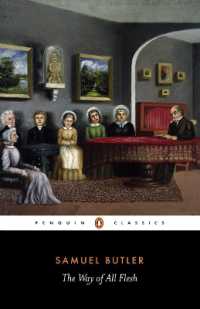- ホーム
- > 洋書
- > 英文書
- > Literary Criticism
Full Description
Shows how Renaissance writers and artists struggled to reconcile past traditions with experiences of 'discovery'.In what ways have colonial and postcolonial studies transformed our perceptions of early modern European texts and images? How have those perceptions enriched our broader understanding of the colonial and the postcolonial? Focusing on English, Portuguese, Spanish and French colonial projects, Shankar Raman explains how encounters with new worlds and peoples irrevocably shaped both Europeans and their 'others'. There are in-depth case studies on: the Portuguese drama and epic of Gil Vicente and Luis Vaz de Camões; travel narratives and exotic engravings from Theodore de Bry's influential compilations; and the English plays and verse of Christopher Marlowe, John Donne and Richard Brome.Key Features* Introduces readers to the careful reading of visual sources as a complement to textual analysis* Emphasises the importance of comparative work in literary studies of colonialism: see especially the discussion of Adam Olearius' travels in Chapter 2 as well as the case studies of Portuguese literary texts and de Bry
Contents
Series Editors' PrefaceList of IllustrationsAcknowledgementsTimeline1 Exploring the TerrainRenaissance Anti-colonialismsImperial TranslationsCannibalsGender and RaceDifference and Repetition2 DebatesTexts and Contexts Tempestuous HistoriesPostcolonial Reactivations of The TempestTheory after ShakespeareOthers and SelvesIreland: Civilised Selves and Barbarous OthersSpain and Turkey: Protestantism and its OthersThinking Differently about Others: Olearius' Travels3 Case StudiesTwo Ways of Looking at Colonial BeginningsUnfinished Histories: Gil Vicente's Auto da ÍndiaHistory as Myth: Luis Vaz de Camões' Os LusíadasTwo Ways of Writing the HeathenWriting the New World Native: de Bry's America IWriting the Chinese: de Bry's India Orientalis IIThe Brome-an Empire: Wonder and Theatre in The AntipodesCan't Buy me Love: John Donne's "Loves Progress"Revolutions that Have No Model: Marlowe's Tamburlaine the Great Primary Works CitedSecondary Works CitedFurther ReadingIndex








